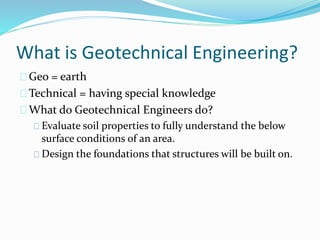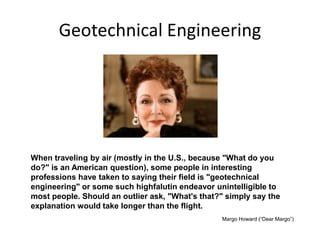More About Geotheta
More About Geotheta
Blog Article
The smart Trick of Geotheta That Nobody is Talking About
Table of ContentsThe Geotheta PDFsWhat Does Geotheta Mean?The Best Strategy To Use For GeothetaThe Best Strategy To Use For GeothetaThe Main Principles Of Geotheta

They carry out site investigations, collect samples, do research laboratory tests, and analyze data to examine the suitability of the ground for building and construction tasks - Geotechnical Engineers. Based on their searchings for, geotechnical engineers supply referrals for foundation style, slope stability, keeping structures, and mitigation of geotechnical dangers. They team up with various other specialists, such as engineers, architectural designers, and building and construction groups, to ensure that geotechnical considerations are integrated into the general job style and execution
By evaluating the actions and residential or commercial properties of soil and rock, they can recognize possible geotechnical dangers such as landslides, dirt negotiation, or slope instability. Their knowledge assists stop failures or crashes that might endanger lives and residential or commercial property. Here are some detailed duties and responsibilities of a geotechnical designer: Site Investigation: Geotechnical engineers conduct website investigations to gather information on subsurface conditions.
They interpret the data to recognize the homes and actions of the dirt and rock, including their stamina, permeability, compaction qualities, and groundwater problems. Geotechnical Analysis and Layout: Geotechnical designers evaluate the data collected throughout website examinations to assess the stability and suitability of the site for construction projects. They perform geotechnical estimations and modeling to review variables such as birthing capability, settlement, incline security, side earth pressures, and groundwater circulation.
The Main Principles Of Geotheta
Foundation Style: Geotechnical designers play an essential function in creating foundations that can safely sustain the designated framework. They evaluate the soil problems and tons demands to determine the ideal foundation kind, such as superficial structures (e.g., grounds), deep structures (e.g (https://www.dreamstime.com/ianhammond2191_info)., stacks), or specialized methods like soil enhancement. They think about elements such as settlement limitations, bearing capacity, and soil-structure communication to establish optimal structure layouts
They examine building plans, monitor website activities, and conduct area evaluations to confirm that the design recommendations are adhered to. If unanticipated geotechnical concerns develop, they evaluate the situation and offer recommendations for removal or modifications to the design. Danger Assessment and Reduction: Geotechnical designers assess geotechnical threats and dangers associated with the task site, such as landslides, liquefaction, or soil disintegration.

Collaboration and Communication: Geotechnical designers work very closely with other specialists included in a project, such as engineers, architectural designers, and building teams. Reliable communication and collaboration are necessary to incorporate geotechnical factors to consider into the overall job design and building and construction procedure. Geotechnical engineers give technical knowledge, solution queries, and guarantee that geotechnical needs are satisfied.
Geotheta Fundamentals Explained
Here are some types of geotechnical designers: Structure Engineer: Structure designers specialize in creating and analyzing foundations for structures. They analyze the dirt conditions, lots needs, and website characteristics to identify one of the most ideal foundation kind and layout, such as shallow foundations, deep structures, or specialized methods like heap foundations.
They assess the aspects affecting slope stability, such as soil residential properties, groundwater problems, and incline geometry, and create approaches to stop incline failings and minimize threats. Earthquake Engineer: Earthquake engineers specialize in analyzing and designing structures to endure seismic forces. They assess the seismic hazard of a website, assess soil liquefaction possibility, and develop seismic design criteria to make sure the security and durability of structures during earthquakes.
They execute area screening, gather samples, and analyze the accumulated data to define the soil buildings, geologic developments, and groundwater conditions at a website. Geotechnical Instrumentation Designer: Geotechnical instrumentation engineers concentrate on surveillance and measuring the habits of dirt, check these guys out rock, and frameworks. They install and preserve instrumentation systems that keep an eye on elements such as dirt settlement, groundwater levels, incline movements, and architectural variations to analyze efficiency and give very early cautions of prospective issues.
The Definitive Guide for Geotheta
They perform examinations such as triaxial examinations, debt consolidation tests, direct shear examinations, and permeability examinations to gather information for geotechnical analysis and style. Geosynthetics Engineer: Geosynthetics designers concentrate on the design and application of geosynthetic products, such as geotextiles, geogrids, and geomembranes. They utilize these products to boost dirt security, enhance inclines, supply drain options, and control disintegration.
They have a tendency to be investigatory individuals, which means they're intellectual, reflective, and inquisitive. They are interested, systematic, sensible, logical, and sensible. Some of them are also social, implying they're kind, charitable, participating, person, caring, useful, empathetic, tactful, and friendly - Geotechnical Engineers.
In the workplace atmosphere, geotechnical engineers utilize specialized software devices to do calculations, produce styles, and examine information. They prepare reports, testimonial project requirements, interact with clients and employee, and coordinate job activities. The office setup provides a conducive atmosphere for research study, analysis, and collaboration with other experts entailed in the task.
Fascination About Geotheta
They often see project websites to conduct site examinations, analyze geotechnical conditions, and collect data for evaluation. These check outs entail traveling to different locations, often in remote or difficult terrains. Geotechnical designers may execute soil sampling, conduct tests, and monitor building tasks to make sure that the geotechnical aspects of the project are being implemented properly.
Geotechnical designers also operate in specialized geotechnical laboratories. In these centers, they carry out experiments, execute tests on dirt and rock samples, and examine the engineering properties of the products. Geotechnical lab engineers work thoroughly in these environments, dealing with testing equipment, running instruments, and recording information. They collaborate with various other lab team to ensure exact and trustworthy screening outcomes.
Report this page